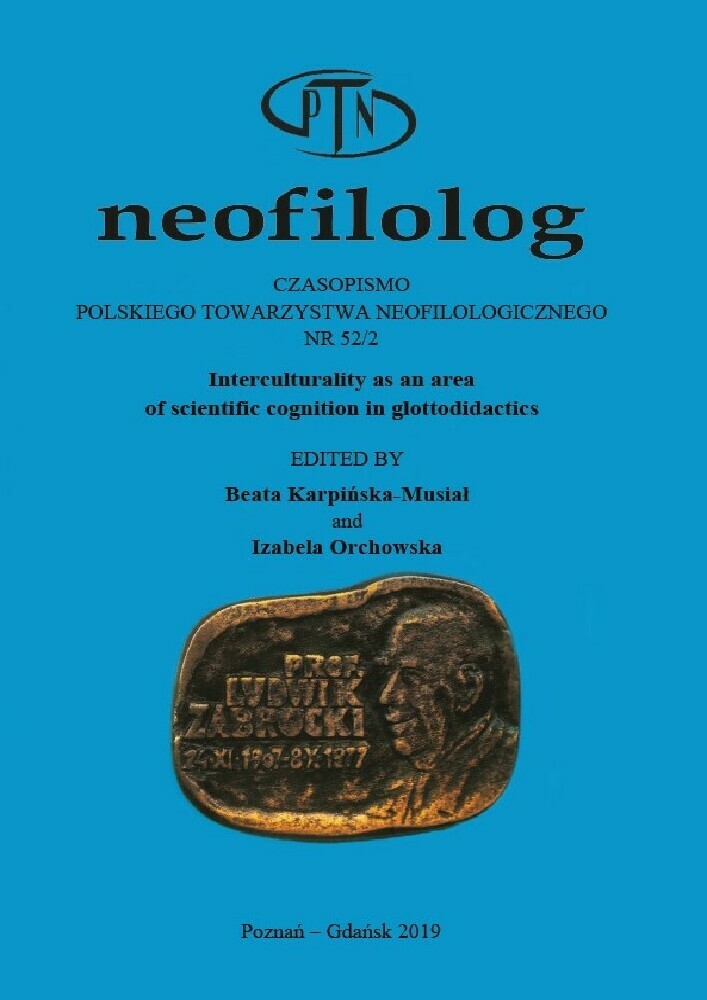Abstract
The following article has two goals. The first is the presentation of theo-retical approaches to the translation of culture-specific content and expla-nation of some relevant terms, which include culture, interculturality, in-tercultural competence and translational cultural competence. The sec-ond is to discuss practical teaching problems and possible solutions that translational didactics must keep in mind in its research perspective. The practical considerations relate to the transfer of written texts and to the education of students who gain their first experiences in translational activity. With questions about the text, which trigger its analysis on the macro- and microstructural level, the students should be motivated to approach cul-tural content reflexively and to reflect it in the target language.References
Altmayer C. (2014), Kulturwissenschaft – eine neue Perspektive für die inter-nationale Germanistik? (w) „Vernum et Lingua“ Nr. 3/2014, str. 58-77.
Bolten J. (2007), Interkulturelle Kompetenz. Erfurt: Sömmerda.
Bührig K., Meyer B. (2015), La pratique multilingue, les régimes linguistiques et la culture traductionnelle dans des hôpitaux allemands, (w) „Langage et société“ nr 153, str. 75-90.
Chłopek Z. (2014), Przekład jako problem dydaktyczny z perspektywy psycholingwistycznej (w) „Języki Obce w szkole” 4/2014, str. 77-84.
Dolata-Zaród A. (2009), Aspekty kulturowe w tłumaczeniu tekstów specjalistycznych (w) „Rocznik Przekładoznawczy” 5, str. 83-91.
Filipiak M. (1996), Socjologia kultury. Zarys zagadnień, Lublin: Wydawnictwo UMCS.
Gerzymisch-Arbogast H. (1994), Übersetzungswissenschaftliches Propädeuti-kum. Tübingen-Basel: Francke.
Grucza F. (1983), Zagadnienia metalingwistyki. Lingwistyka – jej przedmiot, lingwistyka stosowana. Warszawa: PWN.
Grucza S. (2010), Główne tezy antropocentrycznej teorii języków (w) „Lingwistyka Stosowana/Applied Linguistics/Angewandte Linguistik” 2, str. 41-68.
Göhring H. (1998), Interkulturelle Kommunikation (w) Snell-Hornby M., Hönig H.G., Kußmaul P., Schmitt P.A. (Hrsg.), Handbuch Translation. Tübingen: Stauffenburg, str. 112-115.
Haviland W. A., Prins Harald E.L., Walrath D. (2005), Cultural Anthropology. The Human Challenge. Belmont: Wadsworth.
Hejwowski K. (2004), Kognitywno-komunikacyjna teoria przekładu, Warszawa: PWN.
Hinc J. (2016), Übersetzungstechniken in der Übersetzung von kulturspezifischen Inhalten – aus der Sicht der Translationsdidaktik (w) Mihułka K., Bąk P., Chojnacka-Gärtner J. (Hrsg.), Interkulturalität in Theorie und Pra-xis der Glottodidaktik und Translatorik. Rzeszów: Wydawnictwo Uni-wersytetu Rzeszowskiego, str. 105-115.
Kizik E. (2001), Wesele, kilka chrztów i pogrzebów. Uroczystości rodzinne w mieście hanzeatyckim od XVI do XVIII wieku, Gdańsk: Officyna Ferberiana.
Małgorzewicz A. (2012), Die Kompetenzen des Translators aus kognitiver und translationsdidaktischer Sicht. Wrocław: Wydawnictwo Uniwersytetu Wrocławskiego.
Małgorzewicz Anna (2014), Językowe i niejęzykowe kompetencje tłumacza. Próba zdefiniowania celów translodydaktyki akademickiej (w) „Lingwistyka Sto-sowana/Applied Linguistics/Angewandte Linguistik” 11, str. 1-10.
Meyer S., Sprenger G. (2011), Der Blick der Kultur- und Sozialanthropologie Sehen als Körpertechnik zwischen Wahrnehmung und Deutung. (w) Meyer S., Owzar A. (Hrsg.), Disziplinen der Anthropologie. Münster: Waxmann, str. 203-227.
Mocarz M. (2003), Interkulturowość w przekładzie tekstów użytkowych (na materiale rosyjskich i niemieckich tłumaczeń przewodników po Polsce) (w) „Rocznik Przekładoznawczy” 2007/8, str. 161-169.
Mocarz-Kleindienst M. (2014), Kompetencja interkulturowa w dydaktyce prze-kładu (w) „Roczniki Humanistyczne” LXXII, str. 127-137.
Müller-Jacquier B. (1999), Interkulturelle Kommunikation und Fremdsprachen-didaktik. Koblenz: Universität Koblenz-Landau.
Neuland E. (2013), Interkulturalität – immer noch eine Herausforderung für Linguistik und Deutsch als Fremdsprache (w) „Zeitschrift des Verbandes Polnischer Germanisten“ 2, str. 161-177.
Sieradzka M. (2016), Übersetzen als interkultureller Transfer (w) Mihułka K., Bąk P., Chojnacka-Gärtner J. (Hrsg.), Interkulturalität in Theorie und Pra-xis der Glottodidaktik und Translatorik. Rzeszów: Wydawnictwo Uni-wersytetu Rzeszowskiego, str. 89-104.
Tomaszkiewicz T. (2006), Przekład audiowizualny, Warszawa: PWN.
Widła H. (2016), Znajomość języków obcych a znajomość kultur (w) „Języki Obce w Szkole”, 1/2019, str. 86-91.
Wierlacher A. (2003), Interkulturalität (w) Wierlacher A., Bogner A. (Hrsg.), Handbuch interkulturelle Germanistik. Stuttgart: Weimer , str. 257-263.
Witte H. (1998), Die Rolle der Kulturkompetenz (w) Snell-Hornby M., Hönig H.G., Kußmaul P., Schmitt P. A. (Hrsg.), Handbuch Translation. Tübingen: Stauffenburg, str. 345-348.
Żmudzki J. (2013), Holizm funkcjonalny w perspektywie translatoryki antropo-centrycznej (w) „Lingwistyka Stosowana/Applied Linguistics/Ange-wandte Linguistik” 8, str. 177-187.
Żmudzki J. (2003), Transferprozesse und -typen beim Vollzug des Konsekutiv-dolmetschens (w) Antos G./Wichter S. (Hrsg.), Transferwissenschaft. Wissenstransfer durch Sprache als gesellschaftliches Problem. Berlin, New York, Wien, Zürich: Peter Lang, str. 251-264.
Żygulski K. (1972), Wstęp do zagadnień kultury, Warszawa: P.A.X.
https://www.duden.de/rechtschreibung/poltern [DW 7.05.2019]
https://www.hochzeitsplaza.de/mustertexte/hochzeitsanzeigen [23.04.2019]
License
Copyright (c) 2019 Neofilolog

This work is licensed under a Creative Commons Attribution-NoDerivatives 4.0 International License.
Authors
Authors of texts accepted for publication in Neofilolog are required to complete, sign and return to the Editorial team’s office the Agreement for granting a royalty-free license to works with a commitment to grant a CC sub-license.
Under the agreement, the authors of the texts published in Neofilolog grant Adam Mickiewicz University in Poznań a non-exclusive, royalty-free license and authorize the use of Attribution-NoDerivatives 4.0 International (CC BY-ND 4.0) Creative Commons sub-license.
The authors retain the right to the free disposal of the work.
Users
Interested Internet users are entitled to use works that have been published in Neofilolog since 2017, under the following conditions:
▪ attribution – obligation to provide, together with the distributed work, information about the authorship, title, source (link to the original work, DOI) and the license itself.
▪ no derivatives – the work must be preserved in its original form. Without the author's consent, it is not possible to distribute the modified work in the form of translations, publications, etc.
Copyrights are reserved for all texts published since 2017.
Miscellaneous
Adam Mickiewicz University in Poznań retains the property right as a whole (layout, graphic form, title, cover design, logo etc.).

